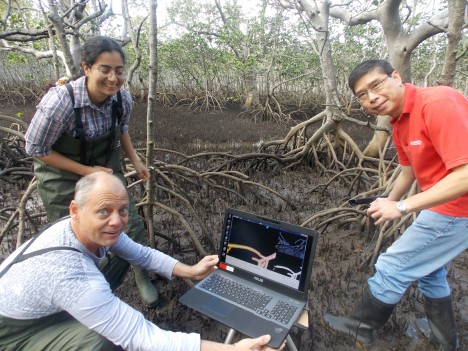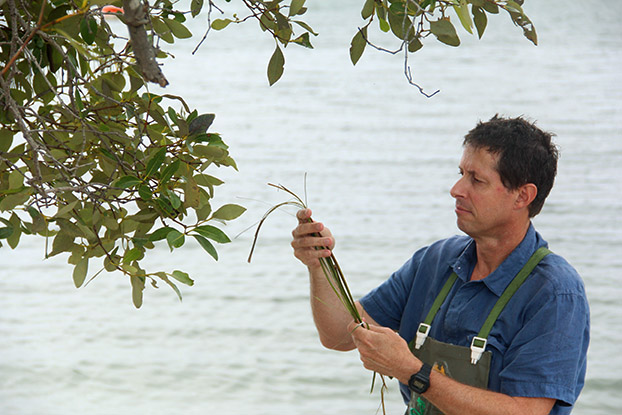Harnessing big data for big changes in the water industry
Big data isn’t just about creating and storing large data sets, but also how we can use that information to make processes more efficient, sustainable and user-friendly. Associate Professor Rodney Stewart from the Griffith School of Engineering is leading the charge in harnessing the power of big data to improve urban water supply.
“We are at the dawn of a new era of widespread smart water metering which, when combined with intelligent analysis and clever engineering, can deliver real benefits to water providers as well as householders’ budgets, and the environment too,” Associate Professor Stewart said.
“This is the relatively new field of hydroinformatics; where engineers, scientists and IT researchers work together to utilise big data derived from the urban water network. As water becomes more expensive and with the recognition that it is not limitless, there is a growing need for consumers and the utilities to have this information so more efficient and sustainable water practices can be devised,” continued Associate Professor Stewart.
The technology needs to provide direct benefits to the consumer.
City-wide intelligent metering implementations have the potential to stream gigabytes of time-stamped water and other associated information (i.e. water temperature and pressure) from the pipe network right down into household appliances such as washing machines, as well as taps and toilets.

A powerful tool
These datasets are a powerful tool for a range of water planning, engineering and customer response decisions but only if processed, refined and reported in a way that is more intuitive and informative than current approaches. Associate Professor Stewart is providing engineering solutions and policy advice across Australia as well as Europe.
“This is a big challenge. What we want to do is have a multi-level understanding of how our water infrastructure is working. This means understanding how an individual household is using water through to monitoring the entire grid, and looking for water leakage and better management plans. The data can be used in so many different ways. It is really exciting,” Associate Professor Stewart said.
Associate Professor Stewart points out that this will not succeed if it helps only the utility companies; the technology needs to provide direct benefits to the consumer. “For example we could detect a post-meter leak in a home and text the householder, or provide comparisons of water usage across the year and suggest ways in which water could be saved. There could even be guidance as to which appliances would best suit a consumer’s needs.”
“As has already been demonstrated in the power industry, providing information about how much water is being used, and in what way, does lead to sustainable choices.”

All the data is collected from one cost-effective smart meter as the water enters the property. This measures water usage, pressure and temperature with extreme accuracy through millilitre measurements taken each second.
Forecasting for efficiency gains
Intelligent analysis of this information, using a variety of predictive algorithms, can then determine how the water is being used, for example if it’s for watering the lawn, or having a shower, or putting on the washing. Each of these records a distinctive pattern of water use (see accompanying diagram). This data can then be compared with usage patterns across an entire city and it is possible from a single sampling point to know if there are unusual deviations such as leaks in the system.
With this level of data and associated predictive algorithms, planners and engineers can forecast water demand and achieve real-time efficiency gains in the water supply network. Perhaps most importantly, it will also be possible to have proactive water loss management rather than discovering large pipes have burst only after significant amounts of water have been lost.
Understandably, large scale smart water metering is supported by water utility companies. Most recently three water suppliers in the Melbourne area; Yarra Valley Water, South East Water and City West Water have supported Dr. Khoi Nguyen and Associate Professor Hong Zhang, colleagues of Professor Stewart to develop a prototype model for autonomously measuring end user behaviour.
“The present customer water information and billing approach is vastly inadequate. An intelligent water metering system supported by data analytics provides an impetus for us to change our behaviour and understanding of water usage. This, in turn will lead to more informed decisions that will positively impact on the consumer’s hip pocket as well as the environment,” concludes Associate Professor Stewart.
How the data is used to understand your water usage
The implementation of smart water meters allows high resolution domestic water consumption data to be captured and remotely transferred to servers housed at the water utility. This collected water consumption flow data can be disaggregated into a comprehensive data repository of end use events (e.g. shower, toilet, washing machine, etc.) using a combination of artificial intelligence algorithms, stochastic models and probability functions, that were derived by the researchers.








Comments are closed.